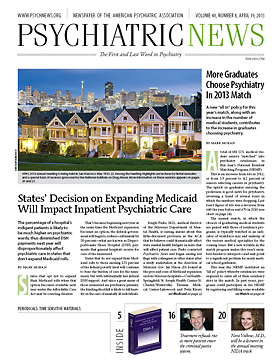An innovative, nonprofit program based in New York City has created a unique opportunity for psychiatrists to collaborate in an effort to provide free mental health services to those who are in need of help but do not have access to these services due to financial hardship.
MilestonesNYC operates on a private-practice model and hinges on the psychiatrists, psychologists, and social workers who donate their time and clinical services to treat patients in their own offices at no cost.
Psychiatrist Scott Shapiro, M.D., who launched the program in 2009, told Psychiatric News that during his time in medical school and residency, he realized how many people lacked access to basic mental health care. “Many people I treated needlessly suffered unwanted pregnancies, job losses, or contracted HIV, perhaps related to untreated mental illnesses such as bipolar disorder, depression, and posttraumatic stress disorder,” he said. Thus, providing people with access to mental health care would vastly improve the lives of individuals and families and go a long way toward preventing such social problems, he reasoned.
Shapiro is an assistant clinical professor of psychiatry and medicine at New York Medical College and has a private practice in Manhattan. He previously served as director of HIV psychiatry at St. Vincent’s Hospital and Mount Sinai Hospital.
Here’s how the program works: When those who need mental health services reach out to MilestonesNYC, local graduate students volunteering as senior care coordinators assess callers for program eligibility. If eligibility requirements are met, the care coordinators match them with one of the provider volunteers based on specialty and location. If eligibility is not met, care coordinators refer callers to appropriate agencies or hospitals in the New York area.
To be eligible to receive services through MilestonesNYC, potential clients must earn no more than $44,000 annually, be uninsured or underinsured, and must not be in crisis or have chronic mental health issues that may require immediate hospitalization or specialized treatment.
“While we wish we could serve everyone, we do not have the resources to be able to do so,” Shapiro said. Most of the patients benefitting from the pro-bono services are struggling with symptoms of mood or anxiety disorders, he noted, and may have had problems obtaining or keeping jobs due to untreated symptoms.
The program fills a gap not covered by local free mental health clinics, which are established to serve indigent patients with severe and persistent mental illness.
Before launching MilestonesNYC, Shapiro said he researched the structure and operations of similar programs, such as Give an Hour, a Washington, D.C.-based organization offering free mental health services to U.S. military personnel and their families, and the Pro Bono Counseling Project, a nonprofit mental health referral network based in Baltimore serving low-income and uninsured families. After consulting with the heads of those programs, Shapiro obtained 501(c)3 legal status and then launched a pilot version of the program and successfully matched eight patients with providers offering pro-bono services.
MilestonesNYC also has a psychoeducation component—some providers may not be able to donate their clinical services, but can instead volunteer by presenting workshops in the community on a variety of mental health topics. For instance, Shapiro presented a workshop on cognitive-behavioral therapy at a church in Brooklyn to an audience of more than 50 community members. Another volunteer gave a lecture on stress management, according to Shapiro.
Clients can see MilestonesNYC providers for up to a year and are then referred to a clinician in the community if they need continuing services, or they may stay with the provider if the provider so chooses, Shapiro said.
He sees numerous benefits deriving from participation in the MilestonesNYC network. “This is a convenient way to give back to the community without ever having to leave the office,” he noted. He also sees the experience as an opportunity to broaden one’s scope of practice in terms of the diversity of patients.
“MilestonesNYC enabled me to use my expertise in addiction treatment to give back to New York City,” Mark Edison, Ph.D., told Psychiatric News. He noted that he didn’t have to travel to see patients, which helped in terms of convenience and scheduling.
MilestonesNYC also accepts donations and maintains an annual budget of approximately $50,000 to $75,000, which supports marketing materials, provider recruitment strategies, and outreach to potential recipients of its free services. “The return on the investment is projected at $15 for every $1 donated,” Shapiro said, “meaning that a donation of $1,000 would provide $15,000 worth of care,” due to the fact that overhead is greatly reduced by providers using their own offices to see clients. ■

